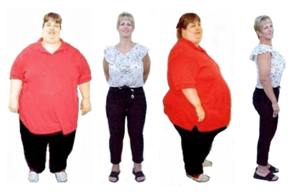
Both before and after you get gastric bypass surgery, your physician may prescribe a special diet to you. Before surgery, your doctor may need you to be prepared for surgery by making sure you have enough protein stores. Some physicians also recommend modest weight loss of 10-20 lbs before surgery so it is easier to operate on you.
After your surgery, a special diet is also needed in order to meet the needs of your changing anatomy. Your stomach will be very small and you probably won’t be able to eat very much; however, you still will need enough protein to heal from the surgery and recover. Below is an example of a gastric bypass diet.
This is just an example – every physician does things differently, so check with your physician to see what he or she wants you to do before and after your surgery.
Pre-Surgery
Reduced Calorie Diet
Prior to surgery, your physician may prescribe to you a specific diet in order to prepare you for surgery. You may have a reduced calorie diet, such as an 1800 or 1600 calorie diet. Some physicians even go as low as 1200 calories. You may need to lose 10 or 20 lbs before your physician will operate on you. This is for two reasons: the first is to prove that you are serious about changing your lifestyle. If you are not serious about weight loss and you go through with the surgery and do not comply with the special diet, you may be at risk for complications, including some that might lead to death. Losing a few pounds beforehand will prove to your physician that you can follow a diet and lose some weight.
The second reason is that it may make it easier for the physician to operate if your liver is somewhat smaller and there is less fatty tissue in the abdominal area. Opinions differ between physicians, but some physicians say the surgery goes better if some weight has been lost immediately prior to surgery.
High Protein Diet
Recovering from surgery takes a lot of protein and energy stores. If you are obese, you have a lot of energy stored in your fat tissue, or “adipose” tissue, but you may not have enough protein stores. Many physicians will put patients on a High Protein Diet just before surgery in order to ensure there are enough protein stores to recover from surgery. Your physician may test your “Albumin” level, which often indicates whether a person is protein malnourished, or if a person has inflammation. If your albumin is low, you may be given protein supplements –milk shakes, powder, or another form- in order to increase your protein stores. Check with your physician, however, before taking protein supplements. Certain medical conditions, such as renal failure, require a lower protein diet.
Example Menu
High Protein, 1600 calorie diet
Breakfast
2 eggs or 1/2 cup egg substitute scrambled without added fat
1 slice toast with 1 tsp smart balance margarine
6 ounces light yogurt
1/2 apple
Lunch
Turkey Sandwich:
3 ounces deli meat
1 ounce cheese
2 slices bread
Nonstarchy vegetables (lettuce, tomato, onion, etc.)
Fat free, low calorie condiments (e.g., mustard)
1 orange
Dinner
4 ounces boneless, skinless chicken breast – baked with 2 tsp olive oil
1 cup non starchy vegetables (spinach, mushrooms, tomatoes, etc.) cooked without added fat
1 dinner roll
1/2 cup corn
8 ounces fat free milk
Snack
9 crackers with 1 tbsp peanut butter
12 grapes
Post-Surgery
In the Hospital
While you are in the hospital, you will probably get very small amounts of clear
liquids immediately after surgery. Clear Liquids include broth, jello, and water. Any liquid that you can see through is considered a clear liquid. You likely will not be allowed to have soda, though. When you are able to tolerate this, you will be advanced to small amounts of full liquids. Full Liquids include milk, protein drinks, and strained liquid soups. Likely you will be discharged on full liquids.
Full Liquid/Pureed Diet after Surgery
When you get home you will continue this full liquid diet for approximately two weeks. On the full liquid diet, it is important you get plenty of fluids and protein. You will only be able to sip small amounts. Aim to take about 2-3 tablespoons of liquids every 15 minutes to stay hydrated, for a total of 48 to 64 ounces daily, depending on your size.
Choose liquid protein supplements that are high in protein, but not in fat or sugar. Half of what you eat/drink should be liquid protein drinks or strained soups. Consult your physician or dietitian to see which supplement is best for you. The rest of what you drink should be sugar-free, alcohol-free beverages like water, sugar-free jello, popsicles, broth, decaffeinated coffee or tea, or other non carbonated sugar free drinks. Soda is not usually allowed because of the carbonation. Also, straws are not recommended for drinking your beverages.
Soft Diet
About two weeks after surgery, you can advance to a soft diet. This is usually after your first post-operative appointment, and your physician will let you know when it is safe. When your diet is advanced, eat small, frequent meals and chew foods thoroughly. Your biggest risks are not getting enough protein and not staying hydrated. Be sure to eat high-protein foods first. Continue to sip fluids throughout the day. Do not drink fluids with your meals; this may make you too full and you might vomit or stretch your stomach out. Your physician will probably also prescribe to you chewable vitamins so that you don’t become deficient in certain nutrients. A sample menu for this phase of the diet is below. Make sure you are also drinking fluids like milk, water, sugar free beverages, decaffeinated tea, etc. between meals.
Example Menu
Breakfast
1 egg scrambled
4 ounces high protein yogurt
Snack
6-8 ounces Liquid Protein Supplement
Lunch
2-3 tablespoons canned tuna packed in water
2 tablespoons mashed potatoes
2 tablespoons pureed carrots
Snack
6-8 ounces Liquid Protein Supplement
Dinner
2-3 tablespoons ground beef
2 tablespoons mashed potatoes
2 tablespoons pureed spinach
Snack
6-8 ounces Liquid Protein Supplement
Restrictions
There are certain foods you should not eat during this phase of the diet. Bread, Pasta, High Fat Cheese, and Dried fruits are all sticky and high in carbohydrates and you may not tolerate them. Certain foods like granola, raw vegetables, salad greens, nuts, and chips may be too crunchy and difficult to tolerate. Really tough foods like tough cuts of meats you also may not be able to eat. Also, any food that has little seeds, like strawberries, or husks, you should avoid.
Progression of Diet
As you get farther away from your surgery, your diet may become more normal. Check with your physician to see what you are allowed to eat. Certain things you may never be able to eat again, like sodas, very sweet foods, sticky foods, or crunchy foods.
